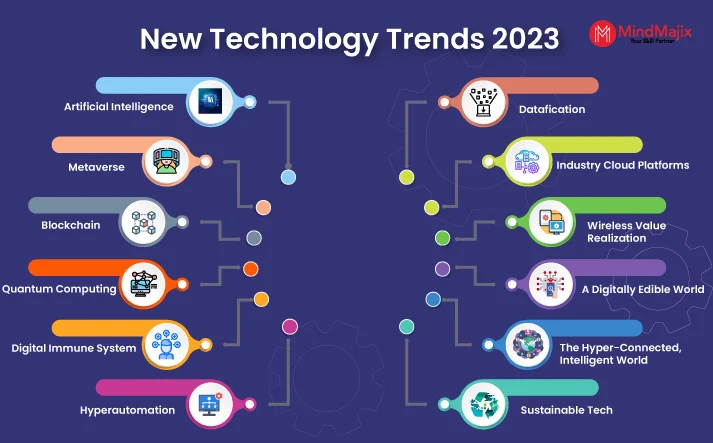The Impact of Quantum Computing on Technology is a topic that has been gaining significant attention in recent years. Quantum computing has the potential to revolutionize the way we process and analyze information. It can significantly impact various industries, including cybersecurity, pharmaceuticals, finance, and artificial intelligence. The development of quantum computing technology has the potential to enable the solving of complex problems at a much faster rate than traditional computers, leading to significant advancements in various fields.
One area of interest surrounding The Impact of Quantum Computing on Technology is its potential to break traditional encryption methods. This has raised concerns about the security of sensitive data and communications. Additionally, quantum computing has the potential to significantly accelerate the development of new drugs and materials, as well as improve the accuracy and efficiency of financial modeling and risk analysis. Moreover, the impact of quantum computing on artificial intelligence is also a topic of great interest, as it has the potential to significantly enhance the capabilities of AI systems.
The Basics of Quantum Computing
Quantum computing is a revolutionary field that utilizes the principles of quantum mechanics to process and store information. Unlike classical computers that use bits to represent information as either 0 or 1, quantum computers use quantum bits or qubits, which can exist in multiple states simultaneously thanks to the concept of superposition. This allows quantum computers to perform complex calculations at an exponentially faster rate than classical computers.
Furthermore, quantum computers leverage the principle of entanglement, where the state of one qubit is linked to the state of another, regardless of the distance between them. This enables quantum computers to process and analyze vast amounts of data in parallel, making them incredibly powerful for certain types of computations, such as factorization and optimization problems.
Applications of Quantum Computing
Quantum computing has the potential to revolutionize various industries and fields, including cryptography, drug discovery, financial modeling, and artificial intelligence. For example, quantum computers have the ability to break many of the existing cryptographic systems, prompting the need for new quantum-resistant encryption methods.
In drug discovery, quantum computers can analyze and simulate molecular interactions at a level of complexity that is currently infeasible with classical computers, leading to the development of more effective drugs in a shorter amount of time. Additionally, quantum computing can significantly enhance the capabilities of machine learning algorithms by quickly processing and analyzing large datasets, leading to more accurate predictions and insights.
Challenges and Limitations of Quantum Computing
Despite its immense potential, quantum computing faces several challenges and limitations. One of the major challenges is the issue of qubit stability and error correction. Qubits are extremely fragile and can easily lose their quantum state, leading to errors in computation. Researchers are actively working on developing error correction techniques to address this issue and improve the reliability of quantum computers.
Another limitation is the current lack of scalable quantum hardware. Building and maintaining quantum systems with a large number of qubits is a complex engineering feat, and current quantum processors are far from reaching the scale required for practical applications. Overcoming these challenges will require significant advancements in quantum hardware technology.
The Impact of Quantum Computing on Classical Computing
Quantum computing is poised to have a transformative impact on classical computing. While quantum computers excel at solving certain types of problems, they are not intended to replace classical computers entirely. Instead, quantum computers are expected to complement classical computers by handling specific tasks that are currently infeasible for classical systems.
Furthermore, the development of quantum algorithms and protocols has the potential to influence classical computing practices. For instance, quantum-inspired algorithms may be utilized to optimize classical computing processes, leading to improved efficiency and performance in various applications.
Societal and Ethical Implications of Quantum Computing
The advancement of quantum computing raises important societal and ethical considerations. With the potential to break traditional encryption methods, quantum computing may necessitate the development of new security measures to safeguard sensitive information and communication networks. Additionally, the widespread adoption of quantum computing could exacerbate existing societal inequalities, as access to this powerful technology may be limited to certain groups or nations.
Furthermore, the implications of quantum computing on privacy and data security are significant. The ability of quantum computers to quickly crack encryption codes has implications for personal privacy and data protection, necessitating the development of quantum-resistant cryptographic solutions and robust cybersecurity measures.
The Future of Quantum Computing Technology
The future of quantum computing holds great promise, with ongoing research and development efforts aimed at overcoming the current challenges and limitations. As the field continues to advance, it is anticipated that quantum computers will become more powerful and accessible, paving the way for groundbreaking innovations in various domains.
Moreover, the convergence of quantum computing with other emerging technologies, such as artificial intelligence and blockchain, is expected to drive synergistic advancements and create new opportunities for solving complex problems. The interdisciplinary nature of quantum computing positions it as a key driver of technological progress in the years to come.
| Technology | Impact |
|---|---|
| Cryptography | Quantum computing has the potential to break current encryption methods and require the development of new, quantum-resistant algorithms. |
| Drug Discovery | Quantum computing can significantly speed up the process of simulating molecular interactions, leading to faster drug discovery and development. |
| Machine Learning | Quantum computing can improve machine learning algorithms by processing and analyzing complex data sets more efficiently. |
| Optimization Problems | Quantum computing can solve optimization problems, such as route optimization and resource allocation, much faster than classical computers. |
| Weather Forecasting | Quantum computing can improve the accuracy and speed of weather forecasting models by processing large amounts of data and complex simulations. |
Quantum computing has the potential to revolutionize various technological fields, from cryptography to drug discovery, by solving complex problems faster and more efficiently than classical computers.




